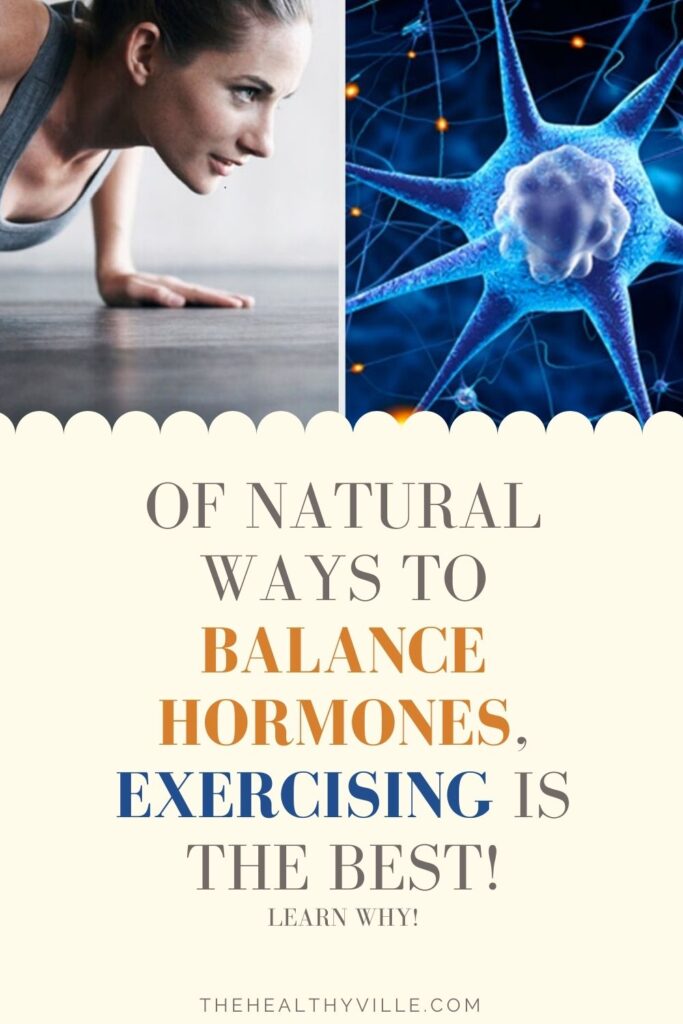Natural ways to balance hormones are many, but none is better than exercising. Find out how working out can help you with hormonal imbalance.
Did you know that, in addition to the endorphins that we generate when exercising, there are also other hormones that are activated with physical activity and favor our general well-being?
Hormones are produced by the endocrine system and balance all the body’s processes. When we train, the hormonal response is activated for a better physical and psychological adaptation. In addition, we can regulate hormones through exercise.
Below we have detailed the most important types of hormones that exist and their functions. Also, you will know how to regulate them using the best of all natural ways to balance hormones, through exercise.
What are hormones?
Hormones are substances released by the secretory or endocrine glands and circulate through the blood to organs and tissues. They play a very important role, since they influence almost all the cells, organs and functions of the body.
Hormones perform the following functions. They:
- Play a decisive role in growth and development.
- Control the use and storage of energy.
- Have dynamic action on various organs.
- Control the metabolization of nutrients.
- Are responsible for regulating sexual functions and other reproductive processes.
- Balance the mood.
However, in order to understand how they work in particular, you must know that there are different types of hormones in the body and each of them fulfills a specific task in it.
Types
Among the most important hormones we find the following:
- Progesterone. It is generated in the ovaries and the placenta (when there is pregnancy), also in the adrenals and liver.
- Insulin. It is responsible for introducing glucose into cells, which is why it lowers blood glucose.
- Thyroxine. It plays a critical role in determining the rate at which metabolic chemical reactions occur in a person’s body.
- Adrenalin. Produced by the adrenal glands. It increases the heart rate, constricts the blood vessels and causes heightened alertness and excitement.
- Serotonin. Neurotransmitter that controls mood, appetite, and sleep. Together with endorphins, we know them as “wellness hormones”. In addition, they affect sexual appetite and the functioning of the vascular system.
- Dopamine. As a neurotransmitter, this hormone increases blood pressure and heart rate. Among other things, it is related to the functioning of memory, learning, sleep and reward systems.
- Melatonin. It modulates the immune system, has an antioxidant effect and is also a cause of sleep.
- Somatotropin. Hormone that causes effects on bones and muscles, stimulates growth and cell mitosis.
- Prolactin. It acts on the breasts, the uterus and the central nervous system. It is responsible for the production of milk in pregnancy, in addition to giving pleasure at the time of sexual intercourse.
- Oxytocin. It is part of the causes of orgasm and is also present in the reactions that cause trust with people.
- Leptin. Hormone produced by adipose tissue, its function is to decrease appetite and increase the rate of metabolism.
- Orexin. It fulfills the function of increasing energy expenditure and inducing appetite.
Why is exercising one of the best ways to balance hormones?
The first thing you should know is that the human body is the set of a whole. The nervous system works shoulder to shoulder with the endocrine system. While one produces neurotransmitters, the other produces hormones that complement each other.
When exercising, the body activates a series of chemical or neurochemical processes to cope with the stress produced by these stimuli. When we train, the body generates adaptations in metabolism, in the respiratory and vascular system, in the blood and globally. These changes are coordinated by the nervous and endocrine systems each time we do a workout and recover from it
In general terms, exercise activates some hormones to regulate our performance each day, and after it, at the time of muscle recovery.
Among the functions that hormones have in the body when exercising are:
- Strengthen muscles.
- Vary the mood.
- Regulate body temperature.
- Stimulate the metabolism to promote weight loss.
Hormones that are activated by exercise
- Antidiuretic hormone. It is related to the absorption of fluids in the bladder.
- Growth hormone. Increases the volume of muscles, bones and collagen. It plays a very important role in fat metabolism. It begins to segregate into the pituitary or pituitary after 25 minutes of exercise. The increase varies according to the duration and intensity.
- Prolactin. Prolactin levels temporarily increase with exercise. It is released by the pituitary and regulates the growth and development of the mammary glands, the production of milk in lactation and the metabolism of salts.
- Endorphins. When you engage in regular, vigorous physical activity, at least three times a week for 60 minutes, there’s a release of endorphins. These increase the state of well-being and decrease the feeling of emotional pain, according to a study by the Karolinska Institute.
In general, exercise, whether low, moderate or high intensity, activates certain hormones in our body. In fact, it stimulates the metabolism and promotes weight loss. Therefore, make sure you do your daily exercises to regulate your hormones!
Don’t forget to SHARE the best of all natural ways to balance hormones with your friends and family on your social networks!

